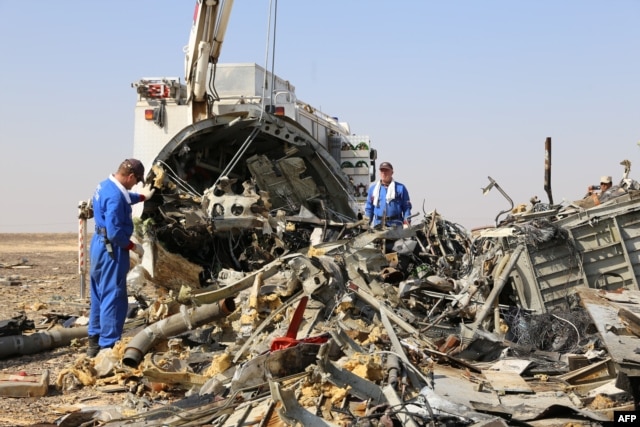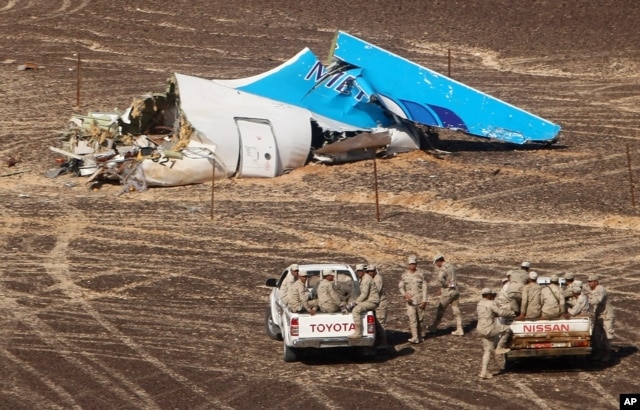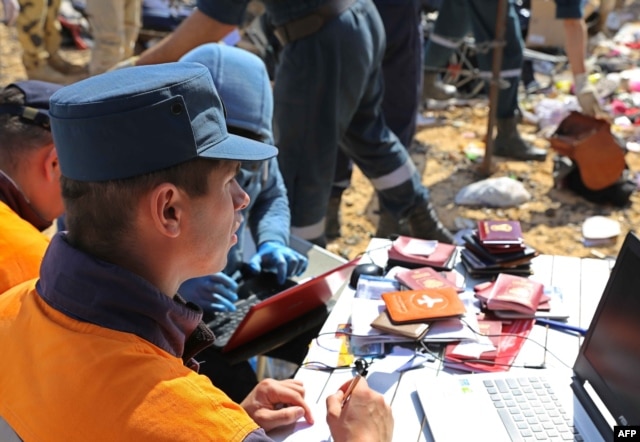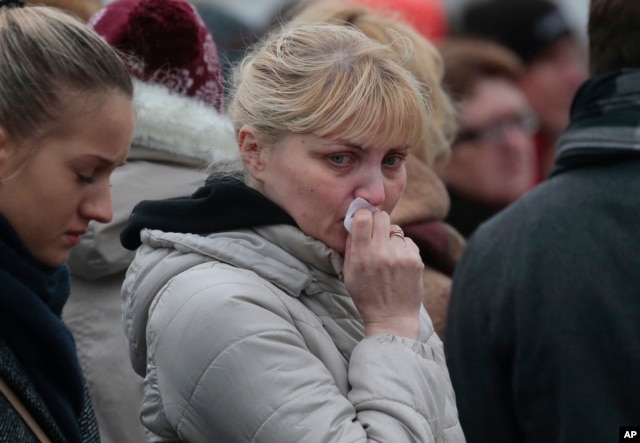
Putin, Cameron Discuss Sinai Crash Bomb Theories
MOSCOW—British Prime Minister David Cameron says he believes it is «more likely than not» that a bomb brought down a Russian passenger jet over Egypt’s Sinai Peninsula last week, killing all 224 people on board.
Speaking before talks with Egyptian President Abdel Fattah el-Sissi is in London Thursday, Cameron also noted that experts are not yet certain of the cause of the crash.
British Foreign Secretary Philip Hammond noted that, «There is a significant possibility that the crash was caused by an explosive devise on board the aircraft.»
But Russia’s government has rejected that theory, saying it is too early to say what caused the plane to crash.
Russian President Vladimir Putin conferred by telephone with Cameron Thursday about Western reports that a bomb may be responsible for the Metrojet crash.
Russian emergency services personnel working at the crash site of a A321 Russian airliner in Wadi al-Zolomat, a mountainous area of Egypt’s Sinai Peninsula. (Russian Emergency Ministry Handout photo)
A Kremlin statement said the two leaders discussed «joint counter-terrorism» work.
Putin and other Russian officials have said no speculation about what actually happened to the Airbus jet should be issued until an official investigation is complete.
Investigation
Investigators are at work studying data recovered from flight recorders and wreckage of the plane. Britain has suspended flights to and from the area, due to what officials say is «the significant possibility» that a bomb blew the jet apart.
Egyptian officials reacted angrily and defensively to the bomb theory, and Russian authorities say it would be best not to jump to conclusions.
Only the investigators can say authoritatively what happened, Putin’s spokesman Dmitry Peskov said Thursday.
In this photo made available Nov. 2, 2015, and provided by Russian Emergency Situations Ministry, Egyptian military forces approach a plane’s tail at the wreckage of a passenger jet bound for St. Petersburg in Russia that crashed in Hassana, Egypt, Nov. 1.
Russia’s Foreign Ministry spokeswoman, Maria Zakharova, said it is shocking that Britain did not forward to the investigators all of its information about the Sinai crash. «If you do not provide this information and use it only in some public appearances,” she said during a briefing televised live from Moscow, «it means that you are pursuing some special purpose.”
Did IS smuggle bomb aboard?
The reports in the U.S. and Britain about a suspected bomb say the Islamic State terror group may have smuggled explosives onto the plane with assistance from someone at the airport.
In Washington, White House spokesman Josh Earnest said the United States has «not made our own determination, but cannot rule out a bomb.»
Earnest declined to discuss what U.S. intelligence officials have learned, adding, «We cannot rule out anything, including the possibility of terrorist involvement.»
U.S. Senator John McCain said Thursday, “There are certainly indications that this was a bomb, but I don’t think there is definitive evidence of that.»
«I don’t think there’s any doubt that, if it was a bomb, it’s ISIS (Islamic State) — proving again the threat of ISIS and the failure of this administration to do anything about defeating ISIS. It’s one of the many results of a failed foreign policy,» said McCain, an outspoken critic of the Obama administration’s policy.
U.S. satellites detected a flash of heat in the atmosphere at the time and place where the passenger jet – a chartered flight carrying Russian men, women and children home to St. Petersburg from their holidays near the Red Sea – dropped out of the sky.
Militants in Sinai affiliated with Islamic State announced they were responsible for the crash. Their claim was widely discredited.
Russian rescuer checking passports collected from the wreckage of a A321 Russian airliner in Wadi al-Zolomat, a mountainous area of Egypt’s Sinai Peninsula. (Russian Emergency Ministry Handout photo)
Islamic State has threatened attacks against Russia, as well as the United States, in retaliation for airstrikes aimed at the militant group’s fighters in Syria and Iraq.
Moscovites question IS involvement
In Moscow, pensioner Natalia Ivanova questioned whether a terrorist group like Islamic State could be responsible. «I don’t think [IS] had anything to do with it,” she told VOA. “I think it was a type of ‘standard catastrophe,’ if I may use that phrase. What does Syria have to do with it?»
Student Anna Sinelnikova disagreed. «Of course it’s terrible. It’s a catastrophe,” she said, “but it was to be expected after the [Russian] military was deployed to Syria.”
Other Russians are reconsidering plans to travel to Egypt, and there have been mass cancellations of tourist trips to the area.
Surveyor Roman Dimaev said he would be scared to fly to Egypt but would likely still go. «Of course, if it is [Islamic State], then everything changes,” he said. “It means they’re targeting Russian passenger liners.»
People react as they come to lay flowers in memory of the plane crash victims at Dvortsovaya (Palace) Square in St.Petersburg, Russia, on Wednesday, Nov. 4, 2015.
Sergei Insarov, a skydiver, was fatalistic about the risks: «In regards to Russians in Egypt, there will probably be an initial shock. But if you remember there was a war in Egypt and Russian tourists kept going, and I think war is a lot more dangerous.”
Extra security
Prime Minister Dmitry Medvedev instructed Russia’s Transportation Ministry Thursday to consider extra security measures for international flights by Russian airlines.
Metrojet spokesmen contend neither pilot error nor technical problems could have brought down the plane. Nonetheless, the company suspended all flights of its remaining four A321 aircraft Thursday, pending checks by authorities.
Authorities in Moscow expect it will take months to complete the investigation of the Metrojet crash, which was the worst air disaster in Russian history.





